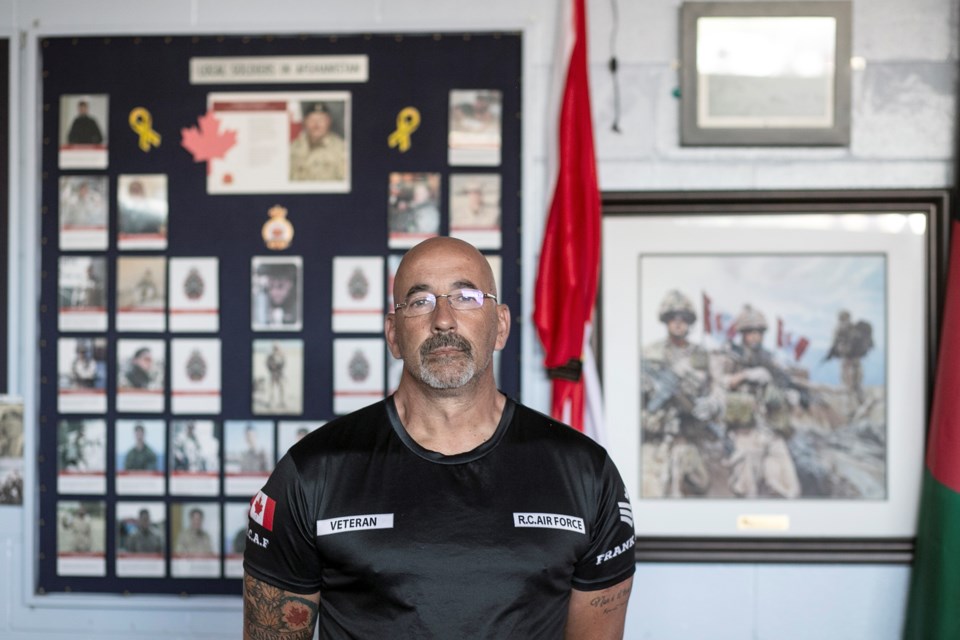The founder of a local group supporting veterans says images of Afghanistan returning to Taliban rule may be difficult for vets to take in.
Frank Iezzi is the co-founder of Algoma Veterans Association, a local grass roots support organization run by former military members.
Iezzi served with the Royal Canadian Air Force and said he was among the first Canadian Forces members to land in Afghanistan in January 2002. He worked in a support role, maintaining and repairing the C-130 Hercules aircraft that were vital in supplying the front lines.
“We had to keep them going,” said Iezzi. “It was encouraging to see that we were making a difference and a big part of that was aircraft dropping off equipment and dropping off manpower and food and water. They used to take a load in two or three times a day.”
Now those same bases used by the Canadian Forces and its NATO partners, as well as cities like Kandahar, have been overtaken by the Taliban, something Iezzi said is hard to watch for him and others who did the work.
“I don’t know how to word it. It pisses you off, it’s discouraging, it’s like we were never there,” he said.
The Canadian Forces remained in Afghanistan until 2014, but Iezzi’s military career ended in 2008, when he retired. In total, about 40,000 Canadians served in Afghanistan over a 12-year period.
In 2016, Iezzi co-founded the Algoma Veterans Association, an organization in which veterans help other veterans.
“We now have about 120 veterans on our Facebook pages,” said Iezzi. “We go out and help veterans when they are in need. We also donate money to veterans when they are in need.”
The group helps veterans in all kinds of ways. Some need a little moral support or a little cash to get them by, some may need an advocate to help with treatment or a medical device. Some others became total shut-ins when they returned to Canada.
“There are a couple of veterans who wouldn’t come out of their homes,” said Iezzi. “We would visit them and make sure they are okay and take them around — just to get them out.”
A decorated wall featuring locals who served in the Afghan War can be found in the basement at the Sault branch of the Royal Canadian Legion. It includes memorials for master Cpl. Scott Vernelli and Sgt. John Faught, among 158 Canadian service members who never made it home.
Iezzi notes many more have died since returning to Canada, some from lasting injuries and others taken by a suicide crisis affecting service members and veterans.
Last year, the Canadian Forces reported 191 deaths by suicide for Canadian military personnel over the past decade.
“The physical injuries are noticeable. The mental health issues are not noticeable,” said Iezzi. “There are a lot of broken vets who are physically disabled or mentally disabled, but the mentally disabled ones nobody will ever know about.”
He expects some veterans of the War in Afghanistan may be troubled by the news of that country once again being taken over by Taliban rule after about 20 years of occupation by NATO partners.
“It’s discouraging to see,” said Iezzi of the images on the news. “The women and children there are not very well taken care of when the Taliban are around. They are used in many ways. It’s a hurtful feeling that things have gone the other way again,” he added.
Iezzi hopes people who know veterans from that conflict will be understanding if those vets are frustrated or angry with what is happening in that country.
Local veterans can reach out to Algoma Veterans Association for assistance through its web site and Iezzi offered his cell phone number at 705-975-4682.
In response to the fall of Kandahar, Veteran’s Affairs Canada sent out information for its VAC Assistance Service, a 24/7 toll-free line for veterans to speak to a mental health professional. It can be reached at 1-800-268-7708.
Members of the Canadian Forces who are currently serving can access the Member Assistance Program at 1-800-268-7708.
Additional information on mental health resources can also be found through the Canadian Armed Forces and Veterans Affairs Canada.
Iezzi also suggested local veterans can reach out to the Royal Canadian Legion Branch 25, the Sault Ste. Marie Veterans UN-NATO Canada Facebook group or the Sault Ste. Marie Commandos.
